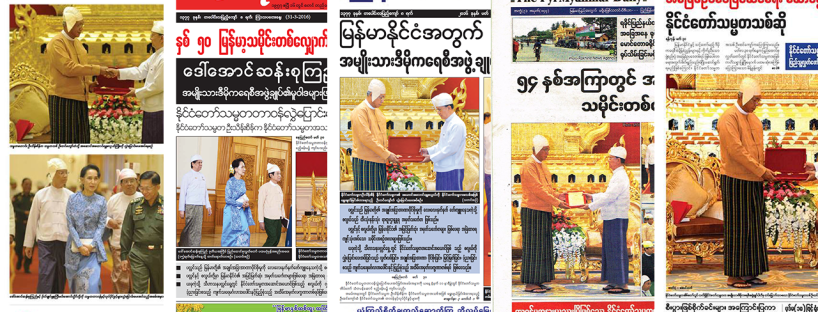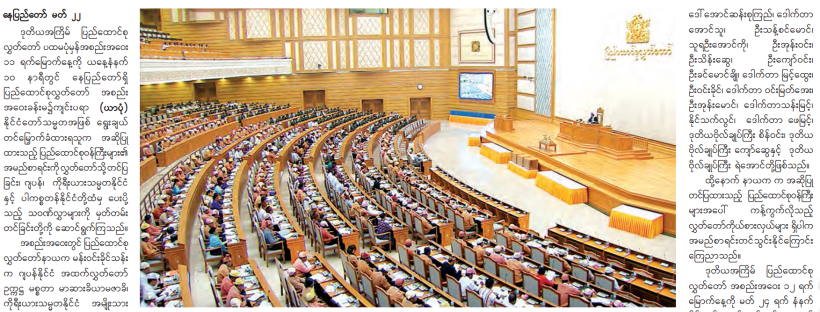March 30, 2016 will be judged by the historians of tomorrow as a significant day for the Burmese people, a day that embodied recent developments in Burma’s political landscape, a day that culminated with the swearing in ceremony of U Htin Kyaw as the country’s new president, the country’s first civilian president in 54 years.
Category: Politics
U Htin Kyaw’s inaugural cabinet: a demographic profile
The morning of March 22, to much anticipation, U Htin Kyaw publicly submitted a shortlist of 18 nominees for ministerial portfolios in his new cabinet, giving the world a glimpse into both how NLD intends to run the civilian government and how the military intends to run ministries under its control. Here’s a closer look at this select group of individuals. Continue reading
U Htin Kyaw’s inaugural cabinet: slimmer and trimmer
A few years ago, I wrote about bureaucratic bloat in Burma’s national government. At the time, Burma had 31 cabinet level ministries, well above Southeast Asia’s regional average. Turns out this is finally being addressed, in one of U Htin Kyaw’s first welcome proposals as the president-elect.
Rediscovering Burma’s former national motto
The other day, I came across something profound. Perhaps it’s been forgotten by the vast majority now, but Burma, like its Southeast Asian neighbors, once had an Indic national motto, during its short-lived parliamentary period following independence from 1948 to 1962.
How to become the President of Burma
With the outpouring of news that the National League for Democracy (NLD) has nominated Htin Kyaw and Henry Van Thio for the posts of Vice-President on Thursday, it’s an appropriate time to examine how the whole process works.
Some thoughts on the politics of economic inequality
The ironic tragedy is that while Burma’s economic system has been decimated by decades of sustained political mismanagement, the country’s education system has also produced some of the world’s most prominent and influential economists, including Hla Myint*, Ezra Solomon*, and Ronald Findlay*, all of whom were educated at Rangoon University. (All subsequently established academic careers outside the country, at world-class institutions like London School of Economics, Stanford University and Columbia University.)
A sarcastic take on USDP campaign slogans
With the 2015 election campaign in full swing, Burmese Facebook users have spared no time in creating political memes in time for November.
The Union Solidarity and Development Party (USDP), established by the military and its close associates in the lead-up to the 2011 election, has especially been hit hard, with a barrage of criticism online by users, in the form of GIFs, image memes and other comments. There’s no doubt that the USDP suffers from a tremendous image problem, because its leadership is largely composed of the same circles that ran the former military junta. Many liken it to a revolving door.
3 key governance issues facing Burma today
In March 2015, Asian Development Bank (ADB) released an excellent working paper, “Myanmar: Cross-Cutting Governance Challenges,” that provides a sweeping outline of the myriad governance plaguing the country’s path toward economic development.
Food for thought: depolicitizing ethnicity in Burma
Robert H. Taylor, a prominent Burma studies scholar, has penned an excellent article on the emotive ethnic-based political troubles that Burma is currently mired in. I’ve written before about the man-made construct of ‘race,’ and the transformation of regional affiliations to ethnic-based ones during the colonial period.
eGov in action: How to verify voter registration online
A few weeks ago, the Union Election Commission launched a website (checkvoterlist.uecmyanmar.org) for Burmese voters to confirm whether they’re actually registered on their wards’ voter rolls, without having to visit the UEC ward offices.
Growing web presence for Burma’s state and local governments
The e-Gov fever has officially hit Burma’s regional governments. Continue reading
Is democracy what Burma really needs?
Just Google “broken congress” (or “dysfunctional congress”) and you’ll be greeted by hundreds upon hundreds of articles heralding the demise of American democracy. It’s no surprise–Americans have a lower rating of Congress than of any other branch in government. And the average American, myself included, feel more and more powerless, more and more disenfranchised, to change a system where the odds are stacked against our favor.
Membership of the Pyithu Hluttaw: A Demographic Profile
Since the election of the 330 odd Pyithu Hluttaw (People’s Assembly) representatives (MP’s) two years ago, I haven’t seen much in the actual composition of Burma’s lower house, a look at the members’ demographic data, aside from their party affiliation. Fortunately, the Pyithu Hluttaw website (pyithuhluttaw.gov.mm) now has biodata for all 314 of the sitting Pyithu Hluttaw MP’s.
Bureaucratic bloat: Bigger is not better
A taste of what’s ahead?
The other day, I watched a fascinating documentary, No place like home, on Al Jazeera’s 101 East about Cambodia’s growing pains, as development speeds up, often at the expense of the people.
Odds are, this is simply a taste of what Burma will face as investment in the country accelerates. News of land confiscation by huge conglomerates (Yuzana, Zaykabar, just to name a few) are (and have been) a dime a dozen for a long time. In fact, Zaykabar’s CEO, Khin Shwe, is sitting as a member of parliament.
Burma’s huge conglomerates remind me of the chaebols in South Korea (like Samsung and LG), because they curried privileges in the formative years to consolidate power and influence. Except in South Korea’s case, chaebols focused on intense manufacturing, whereas Burma’s ‘crony companies’ are focused on extractive industries (gas and gems). But all the same, they’re extending their reach to become jacks of all trades. For instance, 7-Eleven is partnering with Zaykabar to open stores throughout Burma.
Burma can learn from the mistakes of its peers in Southeast Asia, but it will be an uphill battle given the circumstances and conditions on the ground.
Burma simply doesn’t have the capacity or transparency to resolve many of these development issues. The government is focused on PR and cosmetic changes instead of addressing the causes. The national government has little power at the local level, meaning whatever lofty ideas it iterates to press and at parliament never see light. Any laws that attempt to address land usage and land ownership will fail because courts aren’t adequately buffered from influence that weakens their legitimacy. And accountability is just a buzzword.
It’s a sad and vicious cycle that I predict will pan out in more painful ways than one, as Burma gears up for the 2015 election.

A plan of the proposed Hanthawaddy Intl. Airport
In similar news, government officials announced plans to resurrect a project to construct an international airport midway between Pegu (Bago) and Rangoon, in anticipation of growing tourist numbers:
The Hanthawaddy International Airport project, located on a 9000-acre (3642-hectare) site about 77 kilometres (48 miles) north of Yangon near Bago, was first slated for development in the early 1990s. Work began in March 1994 but ceased in October 2003.
All this makes me question the government’s priorities. With an education system in shambles, mass underemployment, continued ethnic conflicts, and deep poverty, the government seems to be preparing itself for a cosmetic change to welcome tourist pockets, well-lined with cash.
This piece, comparing Burma’s and China’s approach to foreign investment, does give me the impression that some policymakers are trying to take a slow growth approach, to allow the country’s civilian institutions to mature before foreign investment picks up pace:
…the current steps show an extreme level of caution. This can be seen in two ways. First, unlike the current situation in China, foreign invested enterprises are treated dramatically differently than domestic enterprises. For example, a foreign invested enterprise cannot lease a building for a period greater than one year. For longer periods, foreign invested enterprises must rent land and build the related buildings at their own expense. The resulting lease is limited to an overall term of 60 years, at which time the building and land revert back to the government. Second, all foreign investment projects must be approved by the central government. Local governments are not permitted to grant such approvals. Many business terms such as the price of leased land must be approved by the central government, preventing private business people from negotiating their own terms.
However, it seems like a leap to say that this is to benefit the country’s people:
The central theme is that the government desires to increase GDP and to allow the benefits of such increase to accrue to the people rather than to government officials. Though FDI will be a part of such GDP growth, the government is still concerned about preventing foreign investors from obtaining an unfair advantage over the local people. For this reason, the government still insists on restrictive terms for foreign investment and still insists on remaining actively involved in investment decisions to “protect” the people and the assets of the country.
Protecting which subset of people? The poor masses or a select elite of cronies to allow them to secure a place in the country’s new order since they cannot compete with international firms?
Grumbles.










